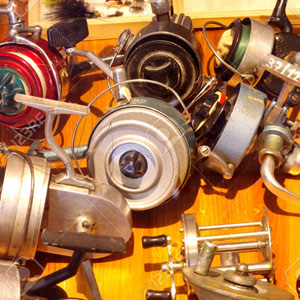Fishing Tackle Care Tips
Fishing Tackle Maintenance
By investing a little time in fishing tackle care, your gear should bring you enjoyment for years to come:
- Keep your lures attractive to the fish by maintaining a shiny finish and investing in a quality tackle box. Wipe down your lures with a soft cloth after each use and store them in individual tackle box compartments so they don't rub against each other and get scratched.
- If your swivels and hooks are rusty, add a little talcum/baby powder to the tackle box compartments to absorb moisture. Also, leave your tackle box open to air-dry for a few hours after use.
- If a tackle box gets dunked or gets wet for any reason, be sure to completely empty everything out of the box. Be sure that both the box and its contents are completely, 100% dry before you put everything back in the box.
- Store fishing lures that have feathers or hair in air-tight containers so insects or small animals will not get to them.
- When transporting your rods, be sure to separate them with towels or foam rubber so they (and the reels) don't rub against each other or vibrate against the boat.
- Check the first few feet of line on your reels for any signs of abrasion that may have happened during the day. If there are any visible weak spots in the line, cut the required length of line off and re-tie your knots. It can be a good idea to snip a couple of feet of line off after each fishing session to keep the line in good shape and to reduce the likelihood of broken line the next time you hook a fighter!
- Monofilament lines are sensitive to direct sunlight and can be damaged if they're left in the sun over a long period of time. If you have reels with monofilament on them, try to keep them in a shaded area in order to preserve the life of the line.
Fishing Reel Care
Properly maintained reels should bring the user many years of trouble free service.
- Often, new reels come with very little lubrication in the bearings. If there is just a little condensation, the bearings will start freezing up or the pinion gear will start wearing away. Personally, I won't put a new reel in the water until it's taken apart and properly lubricated.
- Reels should always be lightly rinsed with fresh water after use (avoid using any water pressure especially around the handles!). Once dry, lightly oil all moving parts and spray with a moisture inhibitor. I prefer using pure silicone oil and/or silicone spray. Silicone can also be used as a line dressing.
- Never stow a rod in its tube. This can trap humidity and cause corrosion of the guide rings.
- To maintain a smooth drag performance, loosen the drag after each use.
- Remove the reel from the fishing rod periodically. Clean and lightly oil the reel foot to help prevent oxidation.
- To maintain top performance, strip your reel completely and do a thorough cleaning and lubrication at least once a year for moderately used reels. For salt water fishing reels, we recommend you do this two to four times per year.
- If you prefer to do your own fishing tackle care and servicing, we highly recommend that you have the parts schematic available. This will help to ensure that everything gets reassembled correctly. If you are not comfortable performing this task yourself, we'll be happy to service it for you. Simply fill out a Reel Repair Form to get started or email us directly.
Prevent Rod Breakage
Read about how to prevent rod breakage, download this six page PDF file »
Water Damage
Important note . . . Water does not have to get inside your reel to ruin it — moisture is enough. If you take a reel from inside your home or your air conditioned car and use it out on the warm waters, you're going to have a problem. Moisture could condense inside the reel, attacking any metal parts or bearings which are not thoroughly lubed and/or coated with a moisture inhibitor. This is why it's important to coat all internal parts, including casings, prior to assembly. If a reel has been dunked, especially in salt water, and you notice it begins to make noise or feel stiff, stop using the reel and have it serviced before the bearings, bushings, or gears become ruined.
Need More Information?
If you need more information on fishing reel repair services or fishing tackle care, let us know, contact us today.



